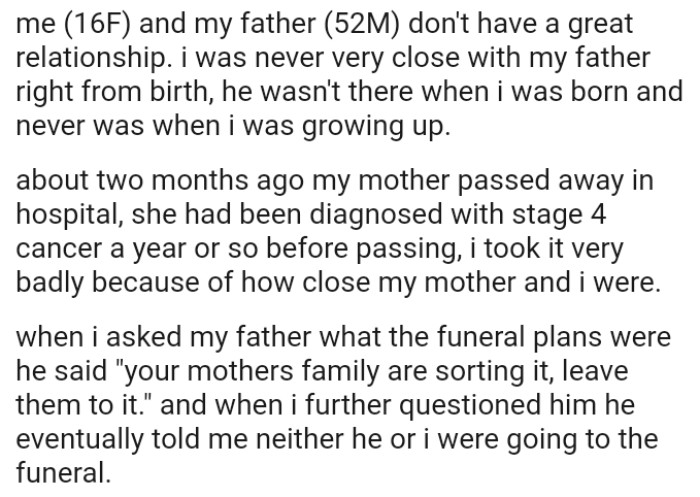Teenager Defies Her Father's Wish And Attends Her Late Mom's Funeral, Terms Her Actions Selfish And Seeks Opinion Online
Anyone can be shocked and in disbelief after learning that their mother has terminal cancer. Whether you lost a parent while you were a teenager or as an adult, getting older doesn't make the sadness go away.
Simply because of where you were when your mother passed away, it might have hurt differently for you. Depending on your age at the time you received the news, a cancer diagnosis may require you to make preparations for losing a parent as a teenager or an independent adult.
Once you receive a terminal diagnosis, you can anticipate a significant change in your life. You'll need to learn coping mechanisms for both getting ready for her passing and for the day the illness finally takes her life.
Sometimes, getting ready for your mother's death is just as challenging as grieving for her. Even before her death actually occurs, you could experience anxiety and depression due to your expectations of it.
OP's mother passed away in the hospital after she had been diagnosed with stage 4 cancer. OP took it very badly because of how close she and the mother were.
When the OP further questioned him, he eventually told her that neither he nor she was going to the funeral. This caused a huge argument, and the OP cut complete contact with him and then moved in with her boyfriend's family.
Read all about it below.
The headline

OP's mom had been diagnosed with stage 4 cancer a year or so before she died

The OP went to her mother's funeral as she had wanted to and with the full support of her boyfriend

Navigating Family Expectations and Personal Grief
The decision to attend a parent's funeral, especially when one feels conflicted about family dynamics, can highlight the tension between personal desires and familial obligations. Psychologists emphasize that grief is not a one-size-fits-all experience; different individuals process loss in unique ways.
Research indicates that individuals may struggle with feelings of guilt or obligation when they feel pressured to conform to family expectations during times of mourning.
Dr. Rachel B. Stein, a clinical psychologist, notes that such conflicts can lead to significant emotional turmoil, particularly when familial relationships are strained.
The Complexity of Grief in Adolescents
This scenario sheds light on the unique challenges adolescents face when coping with loss. Research from the Journal of Adolescent Health indicates that teenagers may struggle with expressing their grief due to developmental factors, such as identity formation and peer influence. This often leads them to internalize their feelings or engage in behaviors that may appear selfish, as they grapple with their emotional responses.
Understanding Adolescent Grief
Teenagers often navigate grief in unique ways, influenced by developmental factors and social contexts. Research from the University of Minnesota highlights that adolescents may struggle to articulate their feelings, leading to conflicting emotions about attending a funeral.
In this scenario, the teenager's decision to attend despite her father's wishes suggests a desire for connection with her late mother's family and a need to process her grief on her terms.
Navigating Familial Expectations During Grief
The decision to attend or skip a family funeral often illuminates the complexities of familial expectations. Research in social psychology suggests that individuals frequently struggle with the pressure to conform to family norms, even when it conflicts with their personal feelings.
Dr. Judith Lewis Herman, an expert on trauma, emphasizes that this internal conflict can lead to guilt and anxiety, particularly when relationships are strained.
OP has offered the following explanation for why they think they might be the a-hole:
I completely cut all contact with my father after calling him several selfish names because he told me that i was not allowed to my mothers funeral, i feel like im the asshole for not asking further questions about why I couldn't go and instead just completely lost my cool with him.
Here are a bunch of the top comments from other Redditors in response to the story

It is yours and yours alone

This Redditor also lost their parent early and no one stepped in for the aftermath

This situation underscores the psychological concept of ambivalence in relationships, where individuals may hold conflicting feelings toward family members. Studies published in the Journal of Marriage and Family reveal that ambivalence can complicate grief processes, leading to feelings of confusion and frustration.
Being aware of these complexities is essential for individuals grappling with their emotions during significant life events.
Additionally, the concept of anticipatory grief may apply in this case, especially if the teenager had foreknowledge of the mother's passing. Studies show that individuals who experience anticipatory grief often process their emotions differently, potentially leading to feelings of guilt or confusion about their choices. This can complicate their grieving process, as they may feel torn between familial obligations and personal needs.
The conflict between parental expectations and adolescent autonomy can create significant emotional tension. A study published in the Journal of Adolescence indicates that teenagers often seek to establish independence, particularly during times of loss, which can lead to decisions that differ from their parents' wishes.
This desire for autonomy is a normal part of development, and understanding this can help parents navigate the complexities of grief with their teenagers.
In many cases, feelings of obligation can overshadow personal grief, leading individuals to question their emotional responses. Dr. Ramani Durvasula, a clinical psychologist, states, "Grief is a deeply personal experience, and societal expectations can often complicate how we process our emotions." This phenomenon illustrates how external pressures can complicate the grieving process. When individuals feel torn between personal comfort and family obligations, it can create a significant emotional burden, as noted by Dr. Durvasula on her website drramani.com.
OP's father could have worked on the relationship he had with the OP

The OP should be wary as he can call the cops and have her home

OP's dad is an AH for trying to stop the OP

The Role of Emotional Support
During times of loss, the importance of emotional support cannot be overstated. Research shows that supportive relationships can mitigate feelings of isolation and enhance coping strategies.
Dr. Jeffrey Guzman, a counselor specializing in grief, emphasizes that having a trusted confidant can help individuals navigate their feelings and gain perspective on their grief.
Engaging in open dialogue with friends or support groups can provide the necessary emotional support during difficult times.
Navigating Family Expectations
Family expectations can add pressure to an already challenging grieving process for adolescents. Research indicates that teenagers often feel compelled to conform to family norms, even when their emotional needs differ. This can create tension and conflict, as seen in this case, where the teenager feels judged for attending the funeral despite her father's wishes.
Recognizing the importance of individual grieving processes is crucial for families, as it allows for a more compassionate understanding of each member's emotional experience.
The Role of Family Dynamics in Grief
Family dynamics play a crucial role in how grief is experienced and expressed. Research from the University of Virginia suggests that open communication about emotions can facilitate healthier grieving processes among family members.
In this case, the teenager's decision to attend the funeral could reflect her need for familial connection, highlighting the importance of understanding each family member's unique grieving process.
The Importance of Personal Boundaries
Establishing personal boundaries is crucial during times of grief. Dr. Brené Brown, a prominent researcher on vulnerability, highlights that setting boundaries is an act of self-care that can promote emotional well-being.
Research indicates that individuals who articulate their needs during emotionally charged situations often experience less anxiety and greater emotional clarity.
This redditor is so sorry for what happened to the OP

This redditor can't imagine not being allowed to attend his own funeral

The conflicts of the OP's dad and his inlaws are not the OP's problems

One effective approach for individuals struggling with the decision to attend a funeral is to weigh the pros and cons of attending versus not attending. Journaling about feelings and potential outcomes can provide clarity and help individuals make informed decisions that align with their values.
Additionally, seeking professional counseling can assist in exploring these feelings in a safe and supportive environment.
Furthermore, the role of communication cannot be overstated in these situations. Open dialogues about grief and emotional needs can foster a more supportive family environment. Studies show that families who engage in honest discussions are better equipped to navigate complex emotions during mourning, leading to healthier relationships.
Emotional regulation is particularly important for adolescents navigating grief. A study from the University of Toronto emphasizes that effective emotional regulation skills can enhance coping strategies during times of loss, reducing feelings of anxiety and helplessness.
Teaching teenagers these skills can empower them to express their grief in healthier ways, ultimately aiding their emotional development.
Therapeutic approaches such as grief counseling can provide valuable tools for navigating these emotional landscapes. Studies show that effective communication can mitigate conflicts and foster understanding among family members.
Engaging in open dialogues about feelings and expectations can create a supportive environment during times of loss.
If possible, some redditors advised the OP to take actions to be allowed to remain with her mother's family legally. Unless there is concrete evidence that the father is unfit to serve as a guardian, it will be very challenging to remain with her boyfriend's family.
But in order to position herself in the best possible legal position, she must act rapidly before he does. She was declared not the AH.
Understanding the Grieving Process
Grief is not a linear process; it varies widely among individuals based on personal history and circumstances. Developmental psychologists emphasize that the context of relationships greatly influences how one processes grief.
The situation described highlights how past relationship dynamics can shape current emotional responses, which is often overlooked in discussions about grief.
It's essential to recognize that choosing to attend or skip a funeral is a deeply personal decision. Experts in grief counseling often highlight the importance of validating one's feelings and choices, particularly in the face of societal pressures.
Allowing individuals to prioritize their emotional needs can lead to healthier grieving processes and improved family dynamics.
Expert Guidance on Coping with Grief
Experts suggest that engaging in open discussions about feelings and boundaries can significantly improve family dynamics during times of loss. Dr. Alan Wolfelt, a noted grief expert, emphasizes the importance of communication in promoting understanding.
Encouraging dialogue can help family members navigate their emotional responses and foster a compassionate atmosphere.
Ultimately, navigating grief is an individual journey that requires a balance between personal needs and social expectations. Acknowledging the emotional weight of these dynamics can help individuals find healthier ways to cope and connect.
By fostering open communication and self-compassion, families can create a supportive environment that honors the complexities of grief.
Psychological Analysis
This scenario illustrates the challenges individuals face when balancing personal comfort with familial expectations. The decision to attend or skip a funeral can reflect a need for self-care, especially in emotionally charged situations.
Recognizing and validating these feelings is crucial for fostering healthy family dynamics during times of loss.
Analysis generated by AI
Analysis & Alternative Approaches
Research in psychology emphasizes the intricate dynamics of family relationships during grief.
Understanding the interplay of personal needs and familial expectations can empower individuals to navigate their grieving process in a way that respects their emotional health while addressing social obligations.
Strategies for Supporting Grieving Teens
Encouraging open communication about feelings and experiences related to grief is crucial for supporting teenagers. Mental health professionals suggest creating an environment where adolescents feel safe expressing their emotions, whether through conversations, writing, or creative outlets.
Additionally, involving teens in rituals related to the deceased can provide them with a sense of agency and connection to their grief, helping them navigate their emotions more effectively.
Psychological Analysis
This scenario exemplifies the natural tension between parental authority and adolescent independence during periods of grief. The teenager's decision to attend her mother's funeral signifies a critical step in her emotional development and processing of loss. It's vital for parents to provide support while respecting their child's autonomy during such challenging times.
Analysis generated by AI
Analysis & Alternative Approaches
Understanding the complexities of adolescent grief is essential for supporting teenagers through loss. Research indicates that fostering open communication and emotional regulation can significantly enhance their grieving process.
Ultimately, recognizing each teenager's unique experience of grief can help families navigate this challenging journey together.
The Importance of Emotional Expression
Encouraging emotional expression is essential for healthy grieving, especially for adolescents who may struggle to articulate their feelings. Research emphasizes that allowing young people to express their emotions in a safe environment can significantly aid in their healing process. This can involve validating their feelings and encouraging open discussions about grief and loss.
Therapeutic interventions, such as art or play therapy, can also provide valuable outlets for emotional expression, helping adolescents navigate their grief more effectively.
Moreover, seeking professional support can be beneficial for adolescents grappling with complex emotions surrounding loss. Mental health professionals can provide tailored strategies to help young individuals process their feelings and develop coping mechanisms. Research consistently shows that early intervention can lead to improved emotional outcomes for grieving adolescents.
Building Resilience Through Grief
Finally, fostering resilience in adolescents during grief is vital. Studies indicate that resilience can be cultivated through supportive relationships, emotional expression, and coping strategies. Encouraging young people to engage with their feelings and seek support can help them build emotional tools to navigate future challenges.
Ultimately, resilience is not just about bouncing back from loss but also about growing from the experience, which can lead to healthier emotional development in the long run.
Psychological Analysis
This situation exemplifies the unique struggles adolescents face when coping with loss. The teenager's desire to attend her mother’s funeral, despite her father's objections, highlights the complexity of emotional expression during grief. Families must recognize these differences and approach them with empathy to facilitate healthier grieving processes.
Analysis generated by AI
Analysis & Alternative Approaches
In conclusion, this scenario illustrates the complexities of adolescent grief and the challenges they face in expressing their emotions amidst familial expectations. Research underscores the importance of open communication, emotional expression, and support systems in navigating these difficult experiences. By fostering resilience and understanding, families can help adolescents process their grief in a healthier way.
Understanding Grief in Context
Grief can be compounded by pre-existing family tensions, making the experience more challenging. Research highlights that individuals often carry unresolved emotions into the grieving process, which can complicate their ability to engage fully in mourning rituals.
Dr. Melissa T. Jacobs, a therapist specializing in family dynamics, notes that recognizing these pre-existing tensions can help individuals navigate their feelings more effectively and find peace within themselves.
Practicing self-compassion is crucial during times of grief. Individuals should allow themselves to feel their emotions without judgment and understand that it's normal to experience conflicting feelings.
Engaging in mindfulness practices can also foster emotional awareness and help individuals process their grief more effectively, creating a sense of acceptance of their feelings.
Psychological Analysis
This behavior reflects a common struggle faced by individuals dealing with complicated family dynamics during times of loss. The decision to attend or not attend a funeral can stir up deep feelings of ambivalence, which can complicate the grieving process.
Recognizing and addressing these feelings is essential for navigating grief in a way that honors both personal needs and family expectations.
Analysis generated by AI
Analysis & Alternative Approaches
This situation illustrates the complexities of grief and family relationships, as well as the emotional challenges faced by individuals during these times.
According to studies in the Journal of Marriage and Family, understanding these dynamics can foster compassion and promote healing among family members.



